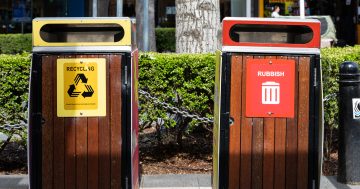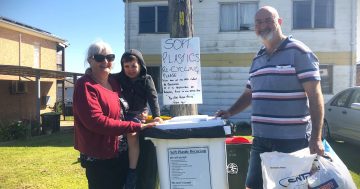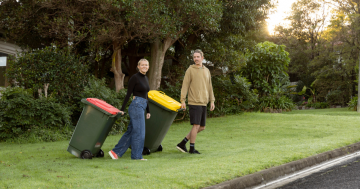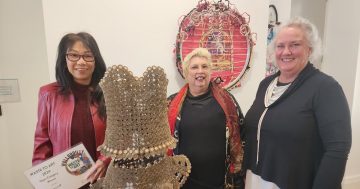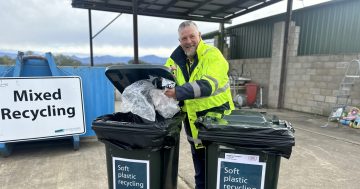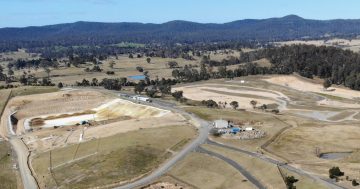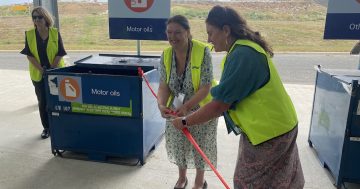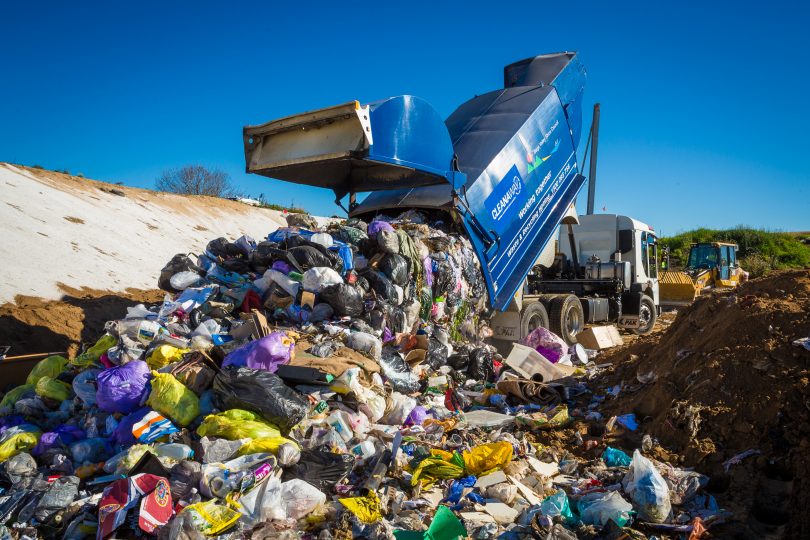
Landfill cells are filing up faster than expected, says Waste Managment Coordinator Joley Vidau. Photo courtesy of Bega Valley Waste and Recycling.
The new FOGO [Food Organics, Garden Organics] program in the Bega Valley has saved the community $33,000 in the month of November compared to figures from November 2017, says waste manager coordinator Joley Vidau, but there is still much work to be done as our landfill cells are filling at “a rate no one could have expected.”
As you go about your Christmas shopping this week and are overcome by desire, social pressure or tiredness to purchase plastic items, think of those things spending the rest of its life trapped in landfill – an anaerobic environment which produces leachate, a “concentration of yuck,” as Vidau puts it.
Making a few changes to how we wrap and buy presents can make a difference to our waste output – consider using natural fiber string to tie gifts instead of ribbon, which is reusable but not recyclable, and wrapping presents in cloth or newspaper instead of paper.
Try using flowers or leaves to decorate your gifts instead of plastic ribbons and rosettes.
As far as common Christmas waste goes, Vidau recommends scrunching wrapping paper to find out if it is recyclable – if it crumples, it’s recyclable, whereas the shiny kind which doesn’t scrunch has to go to landfill.
Recycle your wrapping paper even if it has scraps of sticky tape on it, as a small amount of contamination is allowed in every batch of recycling.
Vidau also suggests that if you are unsure whether to put something in the red or the yellow bin, go for the yellow recycling every time.
“If you put it in landfill, it’s there forever,” she says “but at least if you put it in the recycling, there’s a 50 per cent chance it will be recycled.”
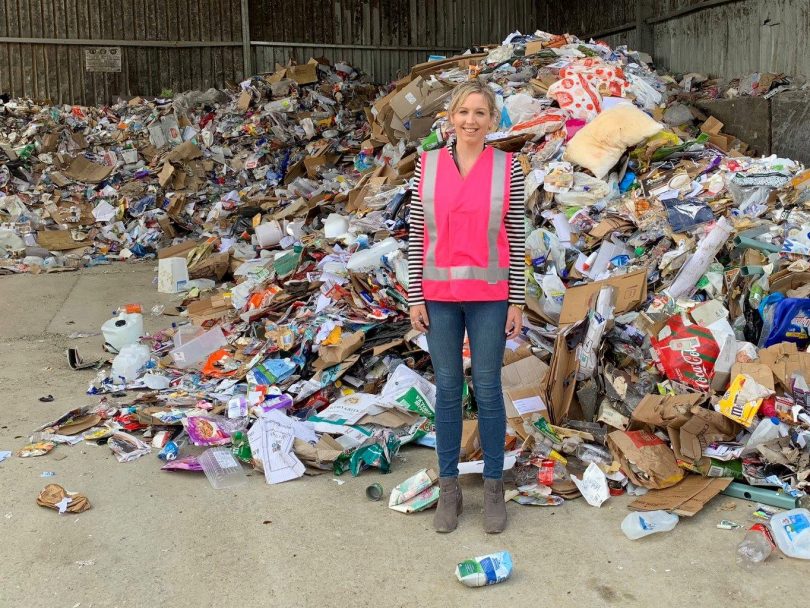
Photo courtesy of Bega Valley Waste and Recycling.
Along with the thought of that shiny wrapping paper languishing in a concentration of yuck forever, there is also a financial imperative to reduce what goes into landfill.
Despite the financial gain of the FOGO program in diverting organic waste from landfill, Vidau stresses that “no tip makes money, and programs like the compost for sale are all about recovering costs so we don’t have to raise rates.”
Making an impact in this respect are Coles and Woolworth’s soft plastic recycling programs, part of the Enhanced Producer Responsibility Scheme, which aims to make those who create waste more responsible for where that waste ends up.
The recycling programs operate from the stores, sending soft plastic to a recycling plant in Canberra to be re-used as composite decking and outdoor furniture.

Anyone can take their clean soft plastics to Coles or Woolworths stores be recycled, such as plastic bags and plastic food packaging. Photo courtesy of Bega Valley Waste and Recycling.
“Recycling soft plastics is incredibly expensive,” says Vidau “and what Coles and Woolworths are offering is very worthwhile.”
The biggest culprits at Christmas time in increasing landfill are food waste and plastic toys, says Vidau.

Try to avoid plastic wrapped fruit and vegetables, and please don’t put them in your FOGO bin, advises the Bega Waste and Recycling Facebook page. Photo courtesy of Bega Valley Waste and Recycling.
FOGO takes care of food waste [remember you can put anything that used to be alive in your FOGO bin, including meat and bones] but we can make a difference by buying carefully and reusing toys instead of throwing them in the red bin, says Vidau.
“Christmas is a time when many of us have a clear out because we have visitors coming or we know we’ll end up with newer versions of things at Christmas,” she explains “but please consider carefully before throwing things out. Our tip shops or an op-shop can often reuse toys.”
The best presents are those which create no waste, such as gifting an experience, or which can be ultimately composted – wooden toys, books, plants, or edible gifts, for example.
Items made from natural fibres tend to be more expensive, but often last longer.
The Christmas waste message is that we’ll pay for it in the end – either at the checkout or in rate increases if we keep filling up landfill cells at a steady clip – two cells at the current site have already been filled in five years, far sooner than anticipated, Vidau says.
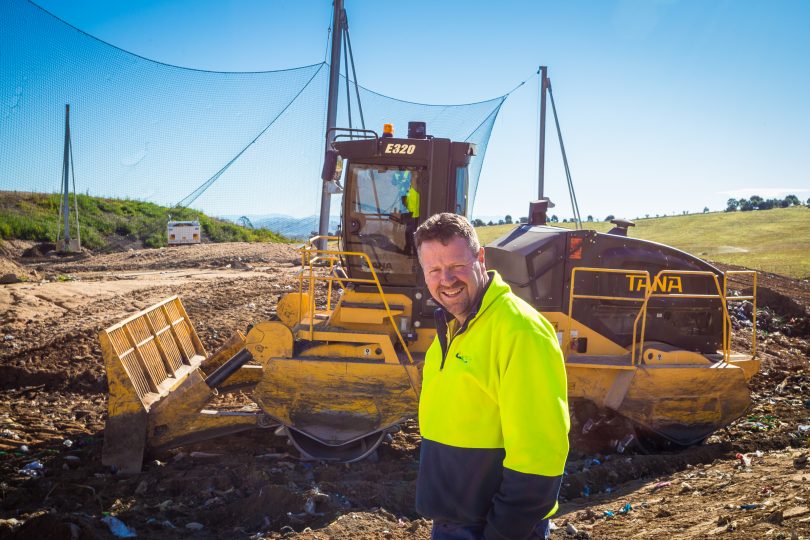
Laws specify how often and how thickly landfill must be covered with soil, says Joley Vidau. Pictured Bega Council worker David Brown. Photo courtesy of Bega Valley Waste and Recycling.
Each time a new cell is opened, it must be lined at a one-off cost to the community of 1.5 million and capped at a cost of one million, says Vidau – a strong financial incentive to slow down the rate we’re filling cells.
This Christmas, fill up with delicious food and put the scraps in your compost or FOGO bin and fill your heart with time with loved ones and experiences rather than plastic gifts.
For more information and tips from Bega Valley Waste and Recycling, please follow their facebook page.







